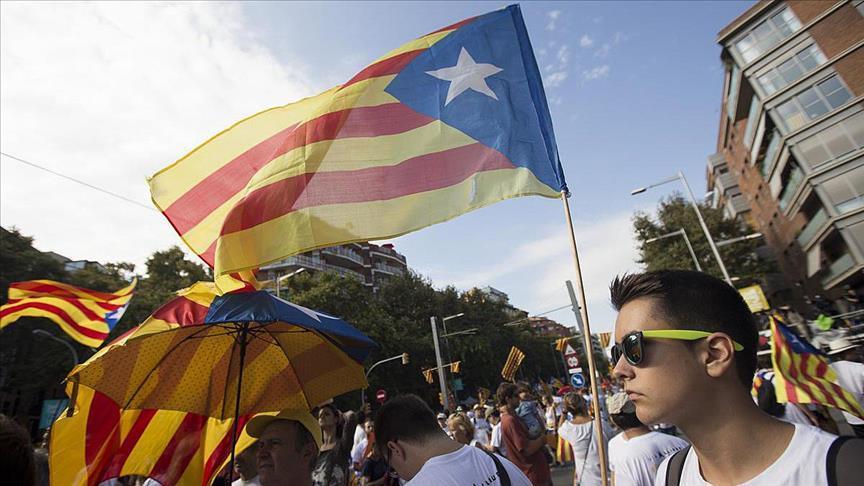Catalan separatists back on track to break from Spain
Parties name new leader for independence project, removing bone of contention and avoiding forced polls in nick of time

By Alyssa McMurtry
MADRID
After a last-minute agreement, Catalan separatists have elected a leader, narrowly avoiding forced elections which were to be triggered at midnight Sunday if the separatists couldn’t agree on who would lead the independence project.
Artur Mas, who had previously been the President of Catalonia stepped aside in favour of Carles Puigdemont, the former mayor of Girona as part of an agreement made Saturday.
Puigdemont was sworn in at 9:47 p.m. on Sunday, just few hours from the deadline, bringing the independence movement back into action in Spain’s wealthy northeastern region.
“We have to start to walk towards the light of the independence declaration to initiate the process of the establishment of an independent state,” said Puigdemont in his election speech.
“These aren’t times for cowards or the fearful or those with shaky legs because it’s our turn to take the responsibility,” said the new Catalan president.
After the regional elections in Catalonia, promoted by the separatists as a plebiscite on whether or not to break from Spain, two independence parties won a parliamentary majority. However, the smaller, far-left CUP Popular Unity Candidacy (CUP) Party refused to support Mas because of his austerity measures and corruption scandals.
This refusal to back Mas left Catalonia without a government since its September elections and nearly caused forced elections, which would have put the Catalan separatists at risk of losing their parliamentary majority.
“It’s taken months to come to this agonizing outcome, months in which the social situation has just gotten worse,” said Lluis Rabell, Leader of Si que es Pot -- Catalonia’s version of Podemos.
Rabell also pointed out that while the separatists won a majority of seats, they lost the popular vote in the “plebiscite” when 52 per cent of voters cast their ballot against the separatists. Podemos is the only unionist party in favour of conducting a legal referendum, similar to the Scottish referendum, on the issue of independence.
Despite questions over the legality or democratic validity of their cause, the separatists claim they have a mandate to leave Spain. In November they passed a motion to begin the formation of a new state, independent from Spain, within 18 months.
The Spanish Constitutional Court unanimously nullified the independence motion, calling it unconstitutional and warned the separatist leaders of the legal consequences of acting on the plan to create a new republic. However, the independence motion explicitly states that the separatists will not necessarily obey the Constitutional Court, even deeming it “delegitimized”.
“The government will not let a single act that is against the law pass by,” said Spanish Prime Minister, Mairano Rajoy, in an unplanned press conference late Sunday evening. He vaguely vowed to take action against independence moves, saying he had “given instructions” to meet any illegal act by the separatists “with the correct response”.
The success of the separatist parties to form a government corresponds with a current power vacuum in Madrid. After general elections in December, Rajoy has been unable to form a government and coalition talks have all failed. However, the need for a strong response to Catalonia could make certain parties more willing to pact and avoid forced elections nationally.
Anadolu Agency website contains only a portion of the news stories offered to subscribers in the AA News Broadcasting System (HAS), and in summarized form. Please contact us for subscription options.







